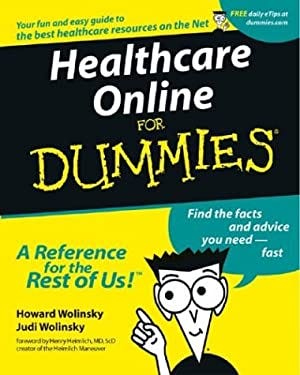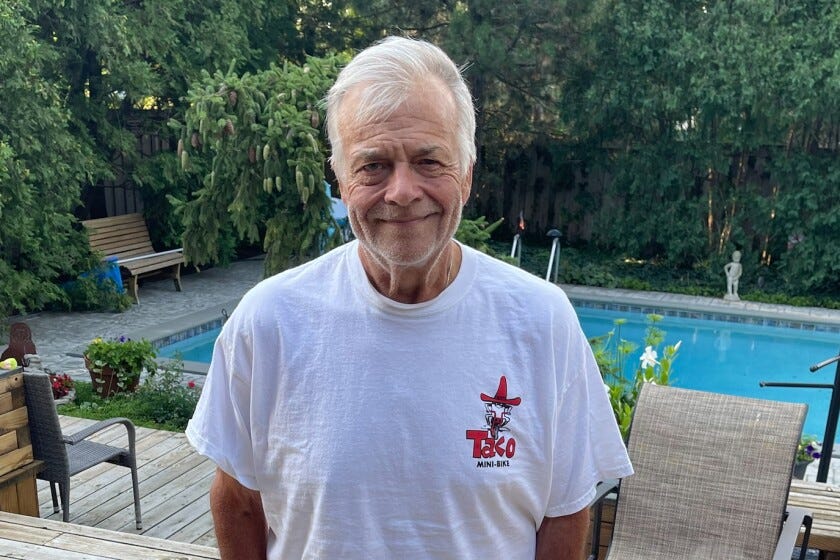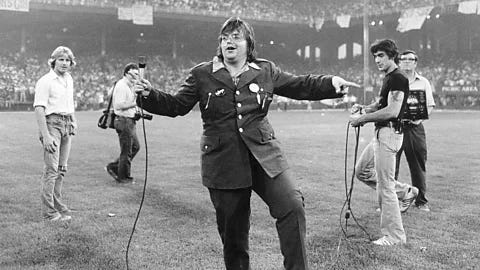For women only: Team up with the Wolinskys against prostate cancer
Online support meeting for women "traveling on the PCa journey"
By Howard Wolinsky
As many webinars and support meetings as I have done on Active Surveillance for low-risk prostate cancer, I have never done one with my wife, Judi.
That’s changing on Tuesday, February 18, 2025 at 8:00 PM Eastern during the ONLINE WOMEN’S SUPPORT GROUP for Fans for the Cure.
Judi and I have been invited to speak to the group.
We want to invite women with spouses/partners/support givers who have prostate cancer, especially those partners on Active Surveillance for lower-risk prostate cancers. Register here: https://fansforthecure.org/online-womens-support-group-registration/
About us
Judi Wolinsky and I have been together for nearly 60 years.
We met as undergrads at the University of Illinois at Urbana-Champaign (Go Fighting Illini!). She was training as an elementary school teacher, but became a librarian. I was a journalism major.
We were married the first two times in 1971: First, by a local rabbi in Kankakee, Illinois, where we lived, to make it official, and the second time in a public ceremony in Chicago by my cousin Maynard, a student rabbi, who didn’t yet have his wings.
A Quechua shaman did the honors in 2008 at the third ceremony at Machu Picchu as llamas and Japanese tourists wandered by. We were attending a yoga retreat in Peru’s Sacred Valley. Judi was later certified as a yoga teacher by Barbra Streisand’s guru,
Judi went back to grad school in the 1990s and became a pioneering internet librarian. (U of I was the center of the merging internet.) I became medical writer/editor, primarily at the Chicago Sun-Times for almost 30 years. I was nominated twice for the Pulitzer Prize for exposes on financial and ethical scandals at the American Medical Association.
And then I taught medical journalism for eight years to grad students at Northwestern’s Medill School of Journalism.
Judi and Iraised two sons. We even wrote a best-seller together as an internet librarians-medical journo team.
We have backed each other up and made each other stronger as we have weathered the many bumps and hurdles you encounter going through a long life together.
(Now in 2026 and then in 1971 plus the shaman who married us with a condor wing.)
Men with Gleason 3+4 on rise in Active Surveillance—come to ASPI webinar
By Howard Wolinsky
It used to be that when you mentioned Active Surveillance/Watchful Waiting for prostate cancer, you’d think of Gleason Gleason 3+3 /Grade Group 1.
But thanks to improvement in diagnosis of prostate cancer from MRI scans and increased use of biomarkers, Gleason 6 has been on the decline, and Gleason 3+4 favorable intermediate-risk cancer is on the rise.
Researchers have seen this coming for a while.
I was on a panel at the American Society for Clinical Oncology in 2017 as the first patient to speak to the organization about AS.
Freddie Hamdy, MD, co-principal investigator of the famed ProtecT trial, which demonstrated the safety of Active Surveillance, was sitting next me.
After the session, he told me that in the years ahead he expected the majority of AS patients would be those with intermediate-risk cancers. Hamdy’s forecast was on the money.
In a new study in JAMA Network covering 2010-2020, researchers found AS has been increasingly accepted by patients with intermediate-risk prostate cancer, especially among those with a PSA of 10 or below. Patients and their urologists have been gaining more confidence that they safely follow intermediate-risk cancer with AS.
Lead author Dr. Michael Leapman, clinical program leader of the prostate and urologic cancers program at Yale Cancer Center and an associate professor of urology at Yale School of Medicine, said he agreed with Hamdy dubbing favorable intermediate-risk patients are “the new frontier” for AS/WW.
In summary, he said: “Most patients in this category [Grade Group 2 and 3] will not experience progression of disease (metastasis or regional spread) but the risks are not trivial either. It is important that we determine more rigorously which Gleason grade group 2 and 3 cancers are less likely to progress. If this can be done in a very reliable way, a substantial number of men could avoid treatment.”
Researchers reported that AS/WW use increased from 5.0% in 2010 to 12.3% in 2020--a more than 50% increase among intermediate-risk patients.
ASPI program on Gleason 3+4 coming on Feb. 25
Kevin Ginsburg, MD, urologic oncologist at the Karmanos Cancer Institute/Wayne State University in Detroit, will be presenting a webinar for Active Surveillance Patients International (ASPI) entitled “Is favorable intermediate-risk PCa the future of AS?"
The program will be held from —12-1:30 pm Eastern, Saturday, Feb. 22. Celebrate President George Washington’s birthday with ASPI.
To register, go to: https://aspatients.org/event/is-favorable-intermediate-risk-pca-the-future-of-as/
Ginsburg is J. Edson Pontes, M.D., Distinguished Endowed Chair in Men's Health at Wayne State and co-director of the MUSIC prostate program.
(Dr. Kevin Ginsburg, co-director of the very successful MUSIC program in Michigan.)
MUSIC (Michigan Urological Surgery Improvement Collaborative) has been one of the most successful U.S. programs for Active Surveillance. Over 90% of patients with low-risk prostate cancer in its program go on AS vs. 60% nationally. Likewise, MUSIC has been successful in offering AS to patients with favorable intermediate-risk prostate cancer at a rate of about 45% compared with 20% nationally.
In 2023, ASPI presented MUSIC with its first ASPI AS ADVOCACY AWARD for its advances in researching and promoting Active Surveillance for lower-risk patients in place of aggressive treatments.
By Howard Wolinsky
Celebs are just like you and me. They get prostate cancer, too.
Here’s some news from the celeb beat:
—Wade Boggs. Baseball Hall-of-Famer Wade Boggs, 66, announced via X on Feb. 7 he is cancer-free. “An extremely emotional day,” Boggs wrote. on X “I can’t thank my doctor’s Dr. Engleman and Dr. Heidenberg enough also to everyone for your thoughts and prayers Debbie and I are pleased to announce I am cancer free 💪🏻🙏.”
The Chicken Man added in a later post, “Home run 👍🏻🐓⚾️.”
He announced he was being treated in September:
—Steve Dahl, Chicago-based American radio icon, best known for Disco Demolition in July 1979 which turned into a riot at Comiskey Park.
Dahl, 70, told the Chicago Sun-Times he will be undergoing radiation therapy for prostate cancer and plans to work through treatment on his podcast.
Steve Dahl, 2025: prostate cancer.
Steve Dahl, 1979: Disco Demolition.
Dahl, Disco Demolition is one the more infamous events in Chicago history and entertainment history. The White Sox had to forfeit the second game in the double header against the Detroit Tigers after a riot.
Of prostate cancer, Dahl told Axios: "It's not a beach party, but it's not as scary and painful as it sounds, or as one might imagine.”
Dahl often has gone public about things in his private life. So get fasten your seatbelt and ready for his prostate cancer journey.
"If I can encourage men to keep an eye on their own PSA and take some of the mystery and macho shame out of it by sharing my odyssey, then I am happy to do it," Dahl tells Axios."I might see about getting a groovy pillow to sit on while yapping, however.”
Should The Active Surveillor accept advertising?
Should The Active Surveillor consider going to an ad-based and sponsorship model?
I want to know what you think. Please respond to this brief confidential survey:
Prostate Cores newsletter
Check out my new Substack newsletter Prostate Cores, abstracts on research on PCa, biopsies, BPH, prostatitis.
Tick-tock. Join the Promise DNA study
If you have been diagnosed with prostate cancer and you want to spit for science and get a free germline test, you’d better hurry.
Christina Tran, MPH senior project manager for Promise, told The Active Surveillor the study has about filled its quota. She said Promise has tested 4,377 men with prostate cancer across the U.S. “We are aiming to test 5,000 to identify 500 men with prostate cancer and germline mutations of interest.”
So sign up soon: prostatecancerpromise.org
MRI-invisible lesions and low-risk prostate cancer
Don’t miss this Jan. 25 webinar from Active Surveillance Patients on MRI-invisible lesions featuring pioneering researcher Dr. Mark Emberton, Professor of Interventional oncology at University College London and Dean of its Faculty of Medical Sciences.
Catch the video here: https://aspatients.org/meeting/mri-invisible-lesions-and-low-risk-prostate-cancer/











